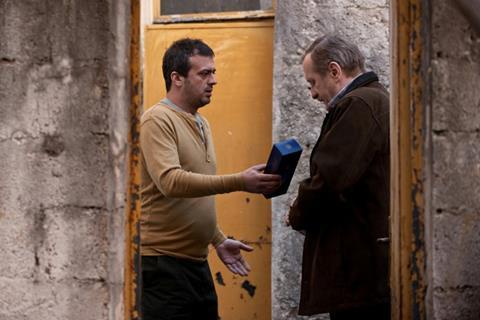Dir/scr: Bobo Jelcic. Croatia-Bosnia and Herzegovina. 2013. 87mins

Bobo Jelcic’s A Stranger (Obrana i zastita) portrays a Mostar so riven that even the most commonplace activities are blighted by disharmony, catastrophe hits frequently without warning and “ordinary people” are near too fed up to go on. A morbidly absurdist twist - that occurs fairly early on but would compromise its nicely disorienting initial shock factor to disclose - jolts the film from the kind of naturalistic society-in-transition satire we’ve grown used to from the Balkan states into the more existential territory hinted at by the title, making for an interesting point of difference while pressing us to consider whether post-war Bosnia and hell itself may be interchangeable.
The sheer unrelentingness of the irksome situations the protagonists sigh and eye-roll through starts to feel one-note, and scenes of interminable, Kafkaesque waiting in offices tip from amusing to over-long.
A lack of enough of the mischievous black wit that has buoyed up more widely accessible films of its type means A Stranger oppressively dour to have much chance of breaking beyond a limited festival run.
A pool of urine in the apartment block landing, abominable phone reception, a stained jacket-sleeve, gall bladder surgery discussed over dinner: the daily life of ageing Bosnian Croat Slavko (veteran regular of former-Yugoslav television Bogdan Diklic, who’ll be less recognised farther afield) is so under siege by banal irritations he wears a permanently beleaguered expression. And he’s not the only one - bickering and casual disdain govern interaction among everyone surrounding him, as do cursing at life and complaints about heartburn and other stress ailments in this Mostar of half-built and part-demolished buildings.
The 1991 carving up of the city can be heard on background television, a device that squarely - and unsubtly - points a finger at the roots of all this angst. When an old friend of Slavko’s dies, it registers to him as yet another insoluble dilemma. With the funeral taking place in the Muslim part of town, he agonises over whether to attend or not, knowing either way he’ll be resented for taking a side.
Dreariness is deliberately compounded by grimy, grainy cinematography, coupled with a lack of music that denies any cheering flourishes. Shuddery, handheld camerawork and a shallow focus that blurs backgrounds lends to the air of confusion. While Slavko’s harried despondence is played convincingly by Diklic, Nada Gjurevska as his wife Milena ramps up similar force of world-weariness when rebuffing her husband’s try at initiating hanky-panky with her as she toils over the stove.
The sheer unrelentingness of the irksome situations the protagonists sigh and eye-roll through starts to feel one-note, and scenes of interminable, Kafkaesque waiting in offices tip from amusing to over-long. Of course that’s partly the point, the claustrophobia built up meant to suggest a society both rotten to the core and inescapable. But with neither hope for Mostar nor change for any of the protagonists on the table, the question of just what the point of this misery fest is inevitably comes up.
“Fate overcomes all of us,” declares one funeral mourner. But without much sweetener in the mix it’s doubtful a wide audience will jump at this onslaught.
Production companies: Spiritus movens, Kadar Production, Croatian National Television
International sales: Spiritus movens, zdenka@spiritus-movens.hr
Producers: Zdenka Gold, Tomislav Bubalo, Tomislav Topic, Josip Popovac, Mislav Brumec
Cinematography: Erol Zubcevic
Editor: Ivana Fumic
Production designer: Mario Ivezic
Editor: Ivana Fumic
Main cast: Bogdan Diklic, Nada Gjurevska, Ivana Roscic, Izudin Bajrovic





















